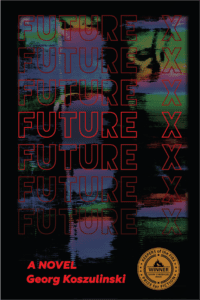
Film Professor at NSCM, Georg Koszulinski’s debut novel, Future X, received Raven Chronicles Press’ Keepers of the Fire Prize for Fiction. Known for his innovative work in filmmaking, Koszulinski now brings his creative vision to the world of literature, a significant milestone in his accomplished career as a storyteller.
Building on the success of his novel, he is already planning to adapt the story into a feature film. The novel is expected to be published on September 5, 2025. The book will be released on Amazon.com along with independent bookstores via Ingram and directly from Raven Chronicles Press’ website.
Koszulinski’s achievement marks an exciting chapter in his career, with more to come adapting this story from hard covers to the big screen.
Brief synopsis of the book:
By the mid-21st century, global communication is dominated by “the feed,” an advanced A.I. system that renders notions of truth obsolete. The feed alters all aspects of social reality, from human-machine sexual relations to the eventual breakdown of global communication. Then the virus strikes. Human civilization goes quiet in a matter of weeks…
Years pass as Jane Ballard searches for survivors until one night she comes across the body of a recently deceased man. The dead man’s journals send Jane on a quest of self-discovery—one that will lead her to the very ends of the Earth, into the dark abyss of her soul and her own past, invoking the question that haunts Jane Ballard forever: why can’t the dead stay dead?
Here is a review shared by Koszulinski by Charles M. Tung from Modernism and Time Machines:
In Future X, award-winning filmmaker and now award-winning novelist Georg Koszulinski gives the reader a timely mash-up of national and ecological collapse, pandemic, and technological dystopia narratives to explore the most dangerous, large-scale, anthropogenic variants (“x”) of our possible futures.
The central drama is one of transmission: the story revolves around an ex-marine who wanders a post-apocalyptic landscape in search of other survivors and happens upon the Dead Man’s writings, which are part media and narrative theory, part descriptions of his work in “archeopsychic extractions.” The protagonist Jane Ballard and a small group of survivors receive a radio message broadcast from the southern hemisphere from others who have likewise made it through multiple overlapping extinction events. And we, the readers, are receiving Jane’s transmission in a twenty-second-century future defined by the historical events she lived through and also the conditions today for the transmission of information and disinformation, knowledge and viral stupidity, and wisdom and world-crashing data.
Appropriately, FUTURE X explores a mash-up of genres best suited to engage realistically and speculatively the challenges of storytelling at a time of the nonhuman turn and species-level existential danger: the expository mode, journal entry, memoir, notes, encyclopedia preface, court document, historiographic timeline, and aphorism. At this moment in history, Koszulinski’s novel brings together all the X’s influencing what the Dead Man describes as “our collective failure to imagine our way out of this world and into another.”
Written by Majdulina Hamed.
Published to Nicholson News on April 1, 2025.
If you have any news, accomplishments or highlights about your work or life, please be sure to share them with us, by emailing us at NicholsonNews@ucf.edu.